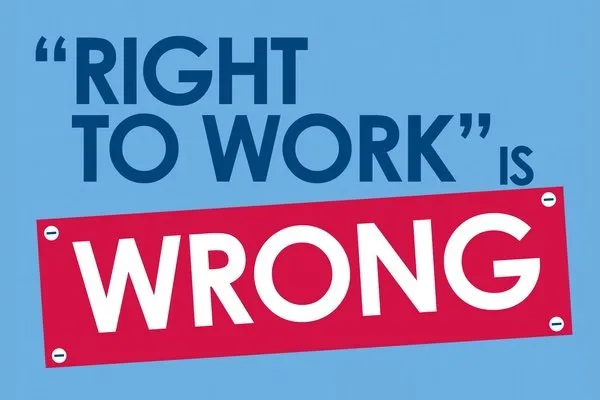“Right to Work” Constitutional Amendment About Politics, Not People

Your corporate-bought legislature at work
An effort by right-wing Republican state lawmakers to put North Carolina’s Jim Crow-era “right to work” (RTW) law in the state constitution with a November 2018 ballot measure is about protecting Republican legislative and congressional majorities in the midterm election.
These laws are a “free rider” scheme to eliminate unions
So-called RTW laws are really "free rider" laws because they force union members to cover the costs of representing workers who do not pay dues - making it harder for working people to work together to raise wages, improve benefits, and secure their economic freedom.
Because of North Carolina’s free rider law, 1 out of every 4 workers covered by a union contract - 44,000 people - pay nothing to secure the benefits they receive, forcing the other 129,000 people who pay their fair share to also pay the tab for free riders.
These laws financially cripple and in some cases can completely get rid of unions. With weak or no unions, corporate special interests can ship more jobs overseas, turn more full-time jobs into part-time positions, and treat more employees like a number and give them less control and flexibility in the workplace.
“In our glorious fight for civil rights, we must guard against being fooled by false slogans, such as ‘right to work.’ It is a law to rob us of our civil rights and job rights. Its purpose is to destroy labor unions and the freedom of collective bargaining by which unions have improved wages and working conditions of everyone.” -- Martin Luther King, Jr., 1961
Free rider amendment is totally unnecessary
North Carolina has had a free rider law since 1947. Adding so-called RTW language to the state constitution after 70 years without it is unnecessary, wastes taxpayer dollars, and moves North Carolina in the wrong direction.
Working people in states with free rider laws like North Carolina’s make an average of $1550 less per year than in other states, and 9 of the 15 states plus DC with the highest unemployment rates are free rider states.
Research demonstrates that higher union membership leads to higher wages and greater access to health and retirement benefits--for union and non-union members alike. In fact, by any measure - wages, benefits, economic mobility, wealth, income inequality, wage inequality, poverty - unions help build the middle class.
More of the same “divide and conquer” politics
After 70 years as a so-called RTW state, at three percent of its total workforce, North Carolina has the second lowest unionization rate in the United States - so it would seem that our free rider law has been a wild “success” without being in the state constitution.
Meanwhile, North Carolina ranks fourth among states where the middle class is dying.
So why are Republican state lawmakers so hell-bent on attacking unions with an unnecessary ballot measure?
Maybe it’s because they’re fearful of an electoral backlash to the election of Donald Trump when voters go to the polls again in midterm elections next year.
When working people work together and vote together to secure their economic interests in the workplace and in the public policy debate, corporate special interests and their bought politicians lose.
The right-wing Republican state lawmakers behind the proposed free rider, so-called RTW amendment seem to be signalling their intent to revert to the same fear- and resentment-based politics that led to the election of Donald Trump.
Instead of trying to “divide and conquer” working people, as U.S. Senator Thom Tillis infamously described the strategy in 2011, lawmakers should focus on winning votes by raising wages, fully funding public education, expanding healthcare, and stop pursuing failed “trickle-down” tax policy that transfers wealth away from the working poor and the middle class.
Read House Bill 819 / Senate Bill 632.
Find out who represents you in the North Carolina General Assembly.
Call 919-733-4111 to tell your state representative and state senator to vote AGAINST putting a so-called RTW, free rider amendment on the ballot in November 2018.
